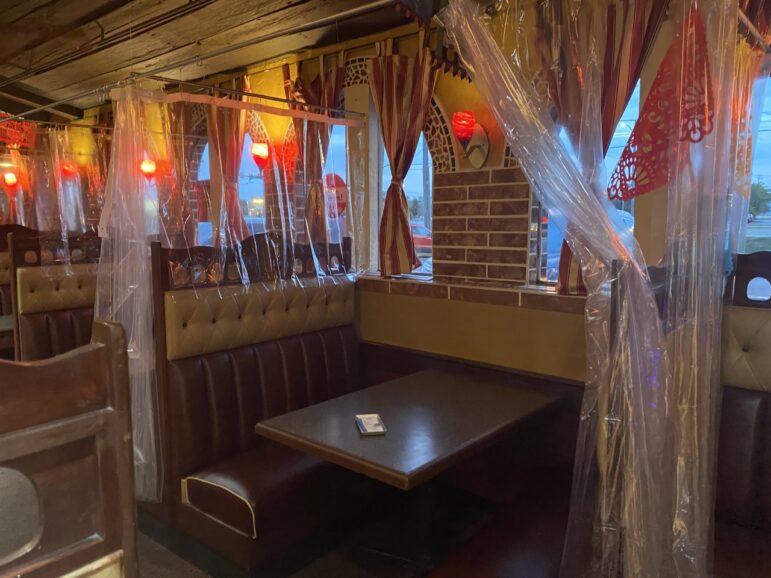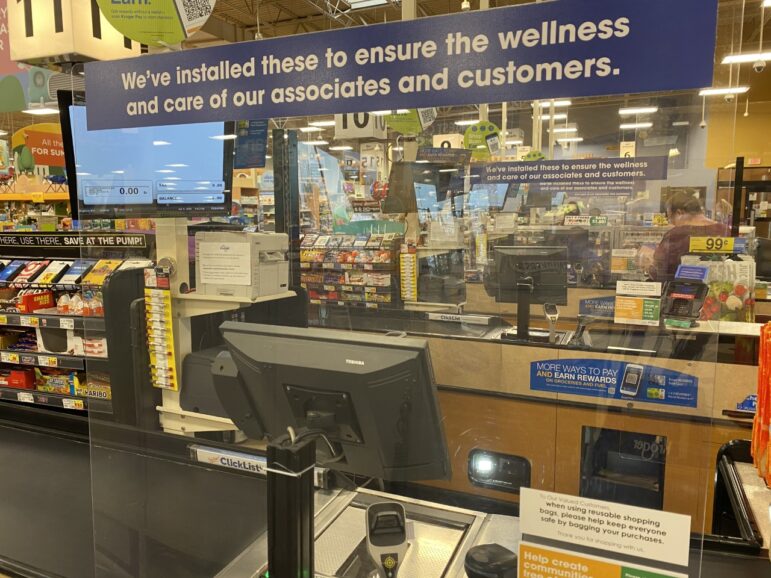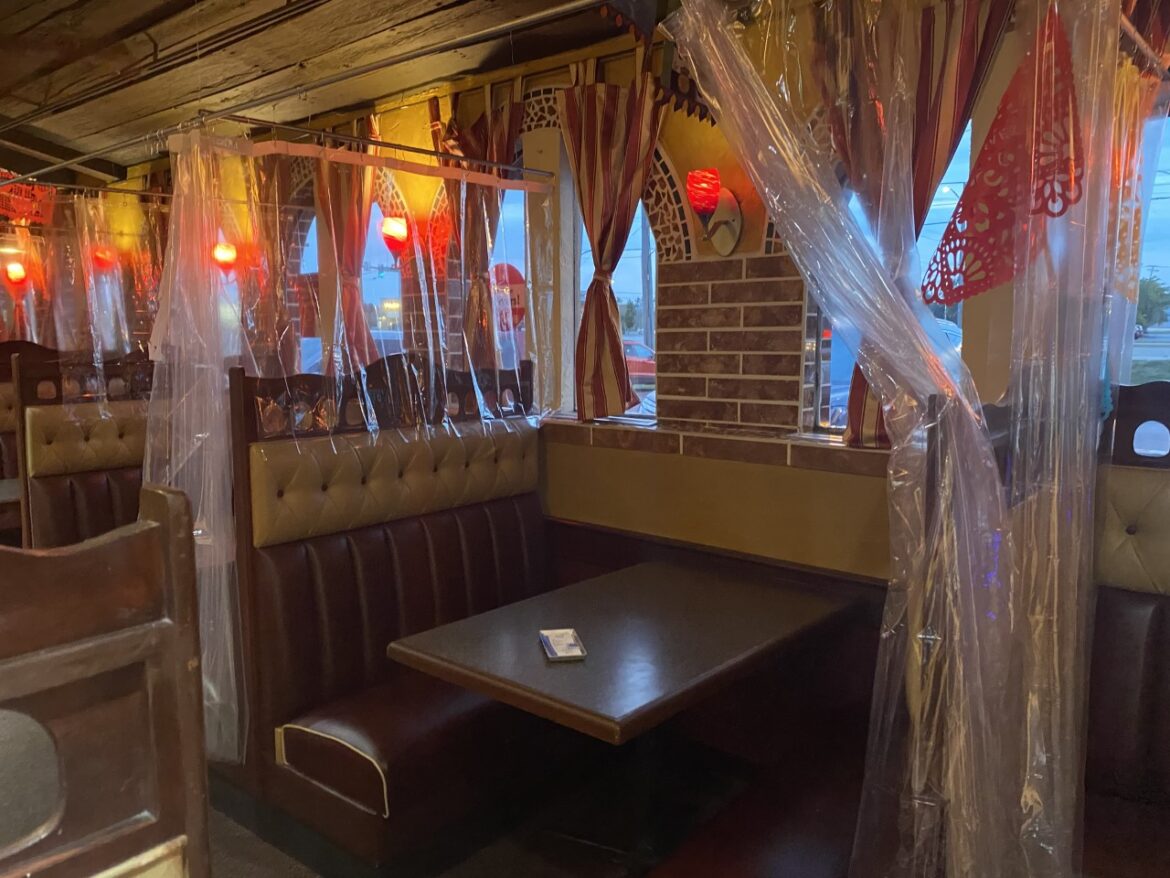
Nick Tomayko
At La Fiesta’s, new plastic shower curtains around booths have led to less dine-in action.MAUMEE, OH – La Fiesta’s is a family owned Mexican restaurant that has been operating traditionally in northwestern Ohio for over 50 years; nowadays, customers wishing to dine-in must do so in between plastic shower curtains.
“The State of Ohio and the Health Department, told us in order to open up (dine-in) we either had to do the six-foot social distancing or we could put shower curtains to maximize the amount of capacity we could use.” said Valentina Carr, an eighteen month employee at La Fiesta’s.
The ongoing health crisis has resulted in change for many local storefronts; in some cases, new health protocols have been with opposition and resulted in less business.
Indoor dining at La Fiesta’s began during the last weeks of May. Governor Mike DeWine’s reopening plan for Ohio states that restaurants and other public service buildings are required to only accept half of their building’s capacity throughout the duration of the COVID-19 pandemic.
“We usually set ever other table, that’s usually at least six feet apart; but if we have to sit tables in between those, we close up those shower curtains.” said Carr.
But when looking at the sales numbers, it appears some customers may not be ready for the changes or perhaps, not ready to be dining out yet at all.
“When the quarantine started we dropped to 15-20% of our normal sales.” said Carr. “With dine-in open, our business has increased. It’s still less than it was before the quarantine began, like a lot less. But roughly I would say we’re around 70% back to where our sales were at. It’s less amounts of people coming out to eat, but people are still ordering large amounts of food and alcohol online.”
Across the street at the local Kroger, a billion dollar corporate-owned businesses faces its own set of problems.
“There were weeks in April and May when our store was losing $50,000-60,000 a day,” said Kroger shift supervisor, Evan McClurg. “When quarantine began, we were getting less than half of our normal amounts of shoppers. We were hemorrhaging.”
Multiple corporate mandated protocols were put into place for the Kroger staff, including hourly hand washing breaks, mandatory surgical masks and plexiglass shields for all cashiers and customer service representatives.

Nick Tomayko
At the Maumee Kroger, many protocols have been put into place including plexiglass boxes and mandatory temperature checks for all employees.“We’ve had a lot of kids quit,” said McClurg. “Most of our baggers are still in high school and some of their parents don’t want them risking exposure to the coronavirus.”
Thankfully, no employee at the store has tested positive for COVID-19 and with quarantine regulations loosening, business has been heading back to normal numbers for Kroger.
“We’re back above water now,” said McClurg. “Sales are normalizing and safety protocols are being enforced. We know not every customer is thrilled about that – we’re simply doing what we have been told to do to minimize the potential spreading of the virus.”
McClurg went on to elaborate on multiple interactions at the customer service desk wherein customers of all ages complained about employees wearing masks and plexiglass dividers. The main problem reported from customers was muffled communication; some even threatened to take their business elsewhere if the changes weren’t removed.
La Fiesta’s has experienced similar backlash; Carr made mention of customers walking out of the dining room due to new governmental protocols.
“Honestly, every shift I’ve worked [since new protocols were put into place] something like that has happened.” said Carr. “Even before, just when we did the plexiglass at the counters and were doing one-way entrance and exits, I had customers yell at me. I would tell them I’m just trying to follow what the state told us!”
Some of the customers don’t even seem to be attempting to practice social distancing.
“We can only sit ten at a table and have to discourage any sort of intermingling,” said Carr. “But we’ve had parties of 20 or 25 try to come in and walk out surprised when they find out they can’t sit together.”
With the final phases of Ohio’s reopening taking place in mid-June and early July, many more businesses are looking at new ways they will have to change their own daily operations. According to their websites, the Toledo Zoo is open the remainder of June to members by appointment only and Cedar Point has plans to open its park the first week of July.
- Already open: Restaurants, aquariums, art galleries, movie theaters, museums and playgrounds
- July 1: Toledo Zoo opens (general admission)
- July 11: Cedar Point opens (season pass holders only)
- July 13-19: Professional & amateur golf tournaments/leagues resume
Only time will tell if proper protocols have been upheld by each individual Ohioan business. Sales numbers may be increasing as quarantine guidelines are loosening but for some, profits are not the goal amidst a national health crisis.
“Right now our goal isn’t to make more money than before,” said McClurg. “Kroger will be okay in the long run. Our goal right now is to keep customers fed and as safe as possible while they’re inside our store.”
